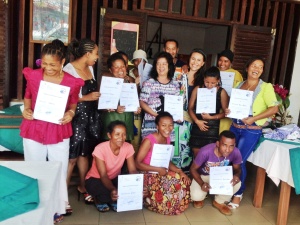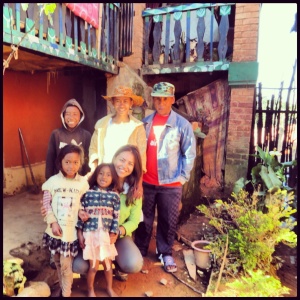I have been here for eight months. There aren’t many things that surprise or shock me anymore. I’ve also become more tolerable of unplanned inconveniences. I’ve become used to having the power unexpectedly shot off and certainly used to expecting there to be no toilet, at any given place. Seeing public displays of breast feeding is normal. Often, especially in the countryside, kids walk around with machetes because they are helping to chop wood or fruit from the forest. I’ve grown to feel comfortable in crowded public transportation. And having rice at every meal has become a norm. I have began my teaching workshops in the SAVA Region! I spent a month in the town of Andapa. The goal is to help hotel workers interact with tourists. I was originally only supposed to stay for two weeks, but they requested that I stay for an additional two more weeks. I’ve been moved by people’s motivation to continue learning. I worked way more hours there than I do at site, and probably also more than I did in the United States, but I think it’s worth it. I was actually really comfortable. I taught at the Madagascar National Parks office and used a huge white board as my teaching surface. Every volunteer’s experience is very different. Even volunteers who live within the same regions have very different lifestyles. Although I am not technically teaching “in a classroom off the coast of Africa,” most of my students come from the countrysides. Most of them did not finish high school but they are exposed to the world outside of Madagascar through tourists. I hope that with my help, they are able to actually communicate and build relationships with the people who visit so that their learning and worldview can continue to expand. My job arranged that I stay at all the different hotels in the town, so I can be familiar with them all. My laundry was washed for me and my meals were prepared at a restaurant. All I did was sit and food would arrive. I didn’t even have to worry myself with having to choose what to eat each day. I liked being surprised everyday. Usually, the girls practiced with me while I ate or asked questions of the day’s lesson. At the end of the day, I was beat! I had agreed to teach so many hours because I understand how difficult it is for people to make time in their schedules to come to class because of how much they work. Being in Andapa gave me a glimpse of people’s daily life. They prepared a schedule among themselves to organize what time everyone would attend class. We are right in the middle of the heavy rain season. Sometimes it rains for hours. I was splashing my bike through puddles in the rain on my way to class one day, and I wondered if my students would even show. I contemplated returning to the comforts of my hotel room and watching a movie. Thankfully, I didn’t because my students did show! It’s serious. I am no expert in teaching a language, but I like to believe that they are learning something, everyday and that’s cool. February flew by in Andapa.
There were many moments of curiosity that lead to adventures and new things. I got to spend time visiting other volunteers in the area on my weekends. One afternoon, I helped wash cows in the river. I had never seen one get washed. When I asked the man if I could help, he giggled in confusion and part disbelief. I learned that during the rice planting season, cows are used to plow the grounds and they are washed afterwards. I got bit by one of those horse fly things on my butt and everyone laughed. We also planted cacao trees at one of Kim’s nurseries. Being at the nursery helping that day was by far a highlight. The people were so full of life, excited , and really happy to have us there. One afternoon, I even ate bat, respectfully at a Chinese dinner party that was hosted by important people in the community. Another volunteer and I biked the 100k to Sambava on a Saturday. The locals thought we were nuts. We stopped at different villages along the way to visit friends and to take breaks. It was so so fun! The hills were killer but some parts felt like I was in a tropical roller coaster. I was going so fast that my face was full of dead bugs at one point. We closed our month of hard work with a ceremony where we presented certificates. The certificates were signed by the president of the Office of Regional Tourism of SAVA, the president of Madagascar National Parks, and me! I gave a speech in Malagassy (which was my first official one) and also in English. Two of my students spoke in English and I was gifted traditional gifts. It was the perfect way to close a month of hard work and dedication. I spent the following week in Sambava, where I was voted VAC (volunteer advisory committee) representative. As VAC rep, I will attend quarterly meetings in the capital and represent the volunteers in my region.
I got to visit one of the local hospitals with my South American friends who are completing their medical studies from Argentina. It was my first time seeing a hospital facility in country. First, I got a tour of the offices, the clinic area, and dentist room. We peeked inside the surgery room and they explained the more common procedures in surgery. I learned that most visits to the hospital are due to Malaria cases, pregnancies, abdominal pains, and other gastrointestinal issues. Patient rooms were separated by gender. We first walked into the delivery rooms. About eight moms with their babies and families greeted us. Then we walked into what Katy and Julita termed the “VIP” room, which was reserved for the recovery of important people. This room was empty and had only three beds, as opposed to ten or fifteen. They explained more about how the hospital works, and how much it costs. I was curious about so many things. I was shocked at the amount of procedures that are possible even with limited resources. I learned that blood transfusions happen live, on the spot because there is no possible way to store blood. “Who brings them food?” Was a question I asked when I learned a whole new twist. When a person is so ill that they must visit a hospital, the whole family prepares to camp at the hospital. They sleep, cook, wash, shower and live there until their loved one is better. WOAH! Hospitals will not even admit a patient if they don’t have family with them. I was so shocked. I can’t imagine what that must be like. Coming from a culture where we live separate from our families for the most part in America, this is mind blowing. Some people make the trip from deep within the countrysides, and bring everyone and everything with them. This includes rice, wood for cooking, stoves, everything. My mind buzzed with so many questions. We walked into the other patient rooms. First the women’s then the men’s. And yes, it was very clear that families were all there helping. But what do you do if you don’t have any family? Or what if your family doesn’t like you? All questions I wondered about throughout the day. The visit to the hospital made a clearer understanding to me of what family means for the Malagasy people. Families serve as nurses because there are very few and that’s just how it works. If you are hungry, in pain, need help using the bathroom, or need to shower, your family helps with that. They even are responsible for washing all sheets and blankets from the hospital. So much is invested when a person is ill. At times, this means taking people away from important work such as planting rice and vegetables during the planting season. This is why people usually wait until their illness has developed to an unbearable state before they decide to come. The family unit here is very very important. I am now preparing to spend two weeks holding workshops in Antalaha.







